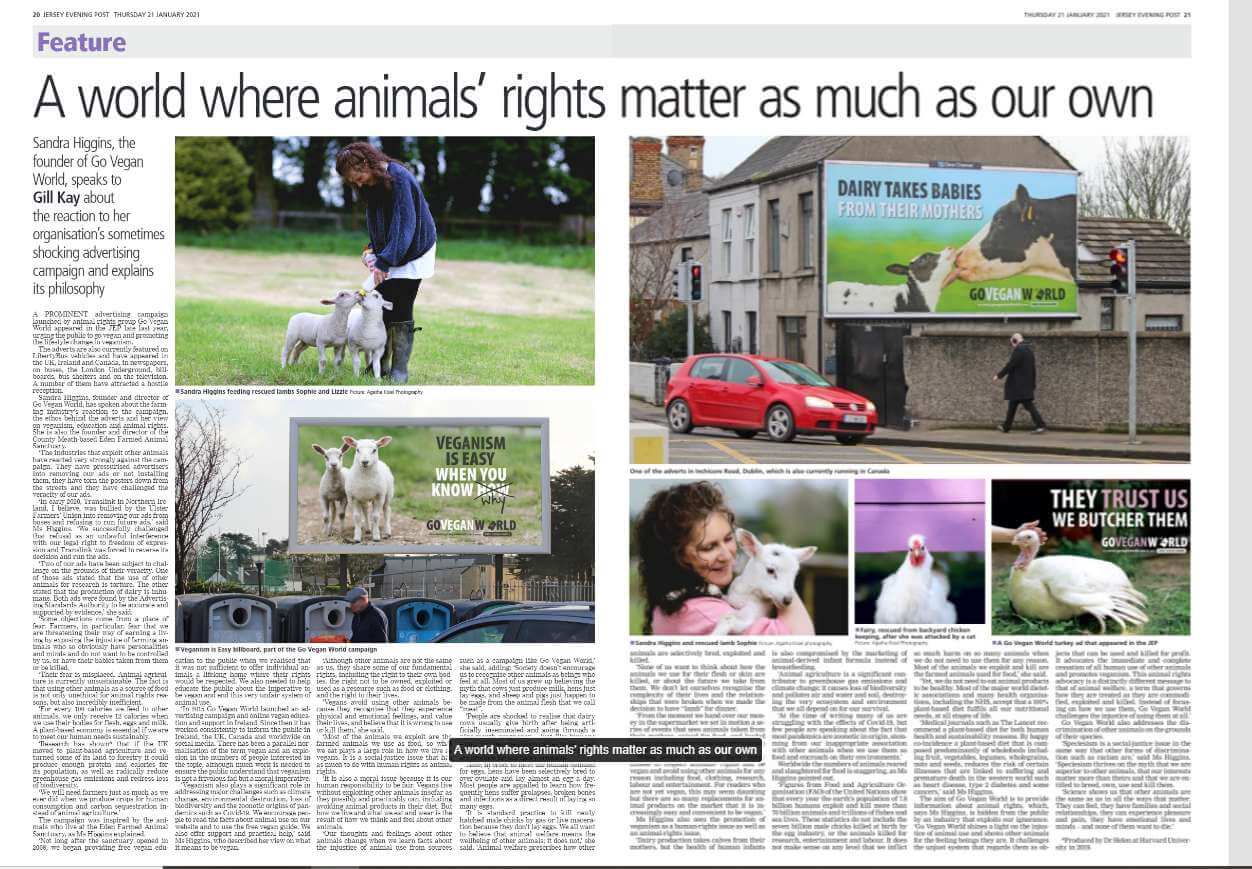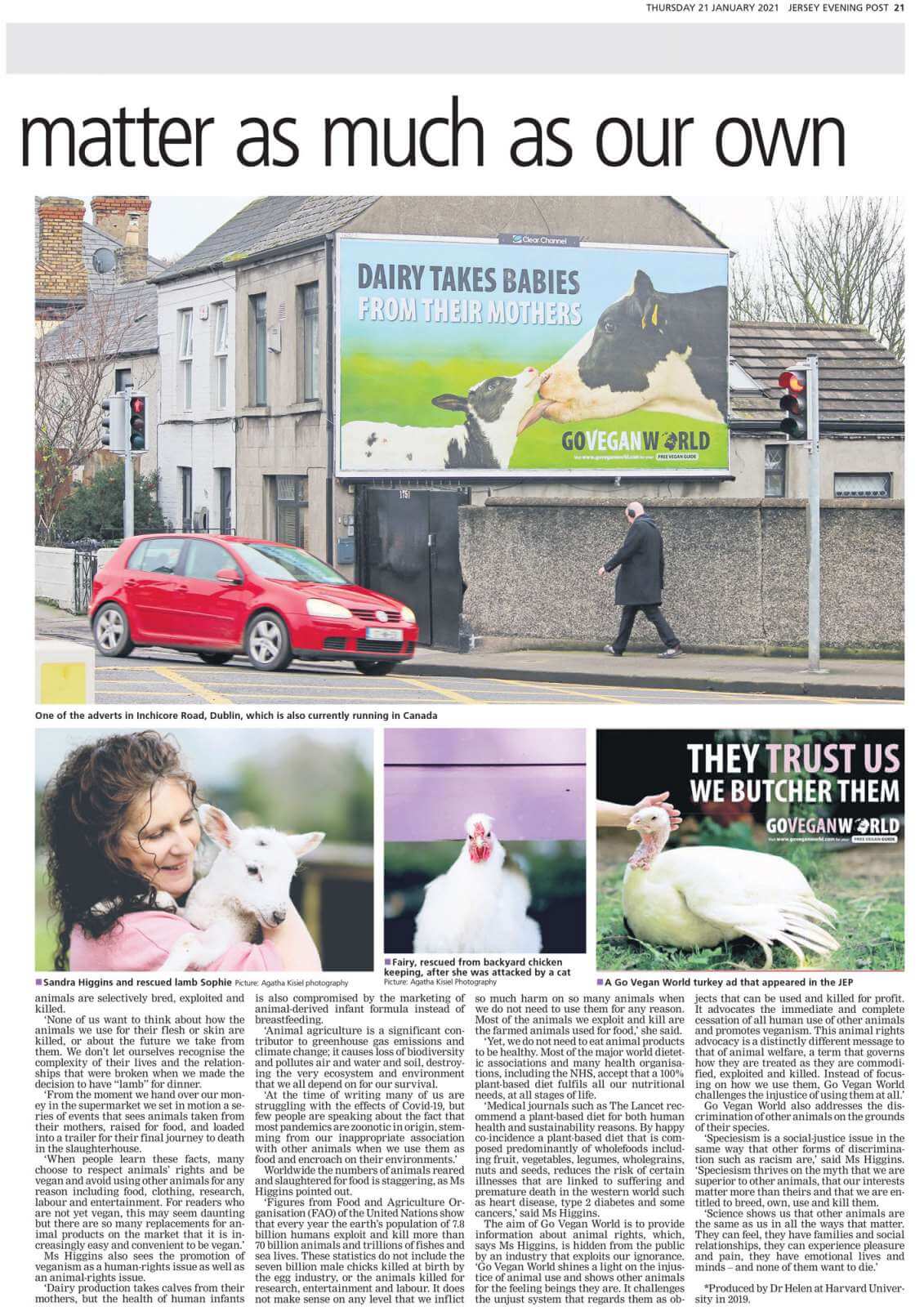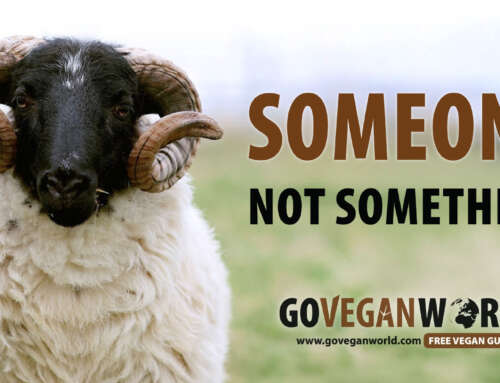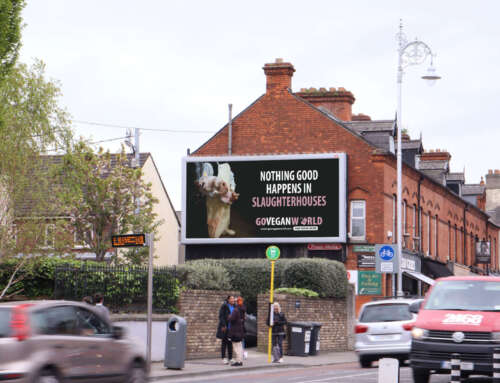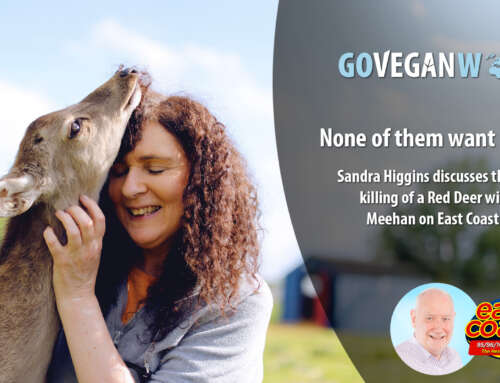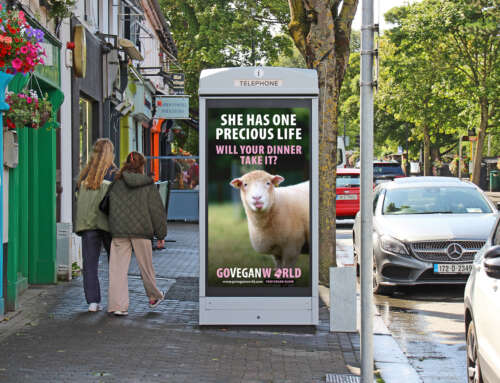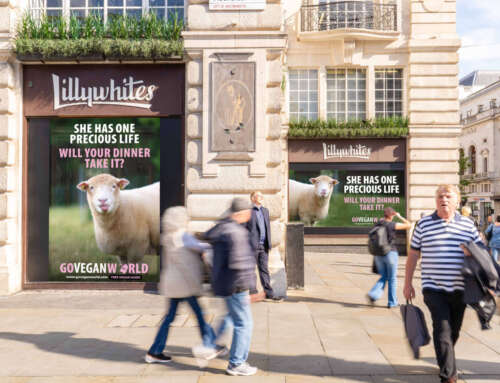21st January 2021
Jersey Evening Post interviews Go Vegan World
At the end of January 2021, when many people are thinking about or beginning to live vegan for the first time, The Jersey Evening Post did an interview with our founder and campaign director, Sandra Higgins.
In an consumerist environment that portrays veganism as a diet or a trendy fad, this interview has a refreshing focus on the roots of this non-violent philosophy and its benefits to animals and humans alike. We learn that veganism is a way of living that shuns the unjust use of other animals because they are feeling beings who value their lives. It gives us a glimpse into the standard, legal violence that is routinely perpetrated on them from the conception to the slaughter of every individual one of the billions of them we kill every year. It clarifies the ways in which animal agriculture is unnecessary, inefficient and harmful, and gives some insight into how farming could be transformed to a plant based system that would help animals, the environment, the economy itself, and human health.
This interview gave us the opportunity to discuss speciesism, which is the root of the problem that other animals face at our human hands, and yet is rarely discussed outside of the animal rights movement. It also gave us the opportunity to clarify for members of the public the completely misleading concept of animal welfare which is an industry term that guides the exploitation, violation, mutilation, and methods of killing animals who share our capacity to suffer.
Interview Transcript:
A PROMINENT advertising campaign launched by animal rights group, Go Vegan World, appeared in the Jersey Evening Post late last year, urging the public to go vegan and promoting the lifestyle change to veganism. The adverts are also currently appearing on Liberty Bus vehicles.
The adverts have already appeared in the UK, Ireland and Canada, in newspapers on buses, the London Underground, billboards, bus shelters, streets and TV adverts, where a number have attracted a hostile reception.
Sandra Higgins, founder and director of Go Vegan World, discusses the farming industry’s reaction to the campaign, the ethos behind the adverts and her view on veganism, education and animal rights and advocacy in particular. She is also the founder and director of the County Meath-based Eden Farmed Animal Sanctuary.
‘The industries that exploit other animals have reacted very strongly against the campaign. They have pressurised advertisers into removing our ads or not installing them, they have torn the posters down from the streets, and they have challenged the veracity of our ads. In early 2020 Translink in Northern Ireland was bullied by the Ulster Farmers’ Union Farmers Association into removing our ads from buses and refusing to run future ads,’ said Ms Higgins. ‘We successfully challenged that refusal as an unlawful interference with our legal right to freedom of expression and Translink was forced to reverse its decision and run the ads. Two of our ads have been subject to challenge on the grounds of their veracity. One of those ads stated that the use of other animals for research is torture. The other stated that the production of dairy is inhumane. Both ads were found by the Advertising Standards Authority to be accurate and supported by evidence,’ she said.
‘Some objections come from a place of fear. Farmers, in particular, fear that we are threatening their way of earning a living by exposing the injustice of farming animals who so obviously have personalities and minds and do not want to be controlled by us, or have their babies taken from them or be killed. Their fear is misplaced. Animal agriculture is currently unsustainable. Using other animals as a source of food is not only unethical for animal rights reasons, but also incredibly inefficient. For every 100 calories we feed to other animals, we only receive 12 calories when we use their bodies for flesh, eggs and milk. A plant-based economy is essential if we are to meet our human needs sustainably. Research has shown that if the UK moved to plant-based agriculture and returned some of its land to forestry it could produce enough protein and calories for its population, as well as radically reduce greenhouse gas emissions and redress loss of biodiversity. We will need farmers just as much as we ever did when we produce crops for human consumption and carbon sequestration instead of animal agriculture.’
The campaign was inspired by the animals who live at the Eden Farmed Animal Sanctuary, as Ms Higgins explained. ‘Not long after the sanctuary opened in 2008, we began providing free vegan education to the public when we realised that it was not sufficient to offer individual animals a lifelong home where their rights would be respected. We needed to help educate the public about the imperative to be vegan and end this very unfair system of animal use. In 2015 Go Vegan World launched an advertising campaign and online vegan education and support in Ireland. Since then it has worked consistently to inform the public in Ireland, the UK, Canada and on social media. There has been a parallel normalisation of the term vegan and an explosion in the numbers of people interested in the topic, although much work is needed to ensure the public understand that veganism is not a frivolous fad but a moral imperative. Veganism also plays a significant role in addressing major challenges such as climate change, environmental destruction, loss of biodiversity and the zoonotic origins of pandemics such as Covid-19. We encourage people to read the facts about animal use on our website and to use the free vegan guide. We also offer support and practical help,’ said Ms Higgins, who described her view on what it means to be vegan.
‘Although other animals are not the same as us, they share some of our fundamental rights, including the right to their own bodies, the right not to be owned, exploited or used as a resource such as food or clothing, and the right to their lives. Vegans avoid using other animals because they recognise that they experience physical and emotional feelings, and value their lives, and believe that it is wrong to use or kill them,’ she said. ‘Most of the animals we exploit are the farmed animals we use as food, so what we eat plays a large role in how we live as vegans. It is a social justice issue that has as much to do with human rights as animal rights. It is also a moral issue because it is our human responsibility to be fair. Vegans live without exploiting other animals insofar as they possibly and practicably can, including avoiding animal products in their diet. But how we live and what we eat and wear is the result of how we think and feel about other animals. Our thoughts and feelings about other animals change when we learn facts about the injustice of animal use from sources such as a campaign like Go Vegan World,’ she said and added: ‘Society doesn’t encourage us to recognise other animals as beings who feel at all. Most of us grew up believing the myth that cows just produce milk, hens just lay eggs, and sheep and pigs just happen to be made from the animal flesh that we call “meat.” People are shocked to realise that dairy cows usually give birth after being artificially inseminated and going through a nine-month pregnancy – just like humans – only for their new-born calves to be taken away so that we can use the milk their mothers produce for our dairy products. Also, in order to meet the human demand for eggs, hens have been selectively bred to over-ovulate and lay almost an egg a day. Most people are appalled to learn how frequently hens suffer prolapses, broken bones and infections as a direct result of laying so many eggs. It is standard practice to kill newly hatched male chicks by gas or live maceration because they don’t lay eggs. We all want to believe that animal welfare means the wellbeing of other animals; it does not,’ she said. ‘Animal welfare prescribes how other animals are selectively bred, exploited and killed. None of us want to think about how the animals we use for their flesh or skin are killed, or about the future we take from them. We don’t let ourselves recognise the complexity of their lives and the relationships that were broken when we made the decision to have “lamb” for dinner. From the moment we hand over our money in the supermarket we set in motion a series of events that sees animals taken from their mothers, raised for food, and loaded into a trailer for their final journey to death in the slaughterhouse. When people learn these facts, many choose to respect animals’ rights and be vegan and avoid using other animals for any reason including food, clothing, research, labour and entertainment. For readers who are not yet vegan, this may seem daunting but there are so many replacements for animal products on the market that it is increasingly easy and convenient to be vegan.’
Ms Higgins also sees the promotion of veganism as a human rights issue as well as an animal rights issue. ‘Dairy production takes calves from their mothers, but the health of human infants is also compromised by the marketing of animal derived infant formula instead of breastfeeding. Animal agriculture is a significant contributor to greenhouse gas emissions and climate change, it causes loss of biodiversity and pollutes air and water and soil, destroying the very ecosystem and environment that we all depend on for our survival. At the time of writing many of us are struggling with the effects of Covid-19, but few people are speaking about the fact that most pandemics are zoonotic in origin, stemming from our inappropriate association with other animals when we use them as food and encroach on their environments.’
Worldwide the numbers of animals reared and slaughtered for food is staggering, as Ms Higgins pointed out. ‘Figures from Food and Agriculture Organisation (FAO) of the United Nations show that every year the earth’s population of 7.8 billion humans exploit and kill more than 70 billion animals and trillions of fishes and sea lives. These statistics do not include the seven billion male chicks killed at birth by the egg industry, or the animals killed for research, entertainment and labour. It does not make sense on any level that we inflict so much harm on so many animals when we do not need to use them for any reason. Most of the animals we exploit and kill are the farmed animals used for food,’ she said. ‘Yet, we do not need to eat animal products to be healthy. Most of the major world dietetic associations and many health organisations, including the NHS, accept that a 100% plant based diet fulfils all our nutritional needs, at all stages of life. Medical journals such as The Lancet recommend a plant based diet for both human health and sustainability reasons. By happy co-incidence a plant-based diet that is composed predominantly of wholefoods including fruit, vegetables, legumes, wholegrains, nuts and seeds, helps reducethe risk of many illnesses that are linked to suffering and premature death in the western world such as heart disease, type II diabetes and some cancers,’ said Ms Higgins.
The aim of Go Vegan World is to provide information about animal rights, which, says Ms Higgins, is hidden from the public by an industry that exploits our ignorance. ‘Go Vegan World shines a light on the injustice of animal use and shows other animals for the feeling beings they are. It challenges the unjust system that regards them as objects that can be used and killed for profit. It advocates the immediate and complete cessation of all human use of other animals and promotes veganism. This animal rights advocacy is a distinctly different message to that of animal welfare, a term that governs how they are treated as they are commodified, exploited and killed. Instead of focusing on how we use them, Go Vegan World challenges the injustice of using them at all.’
Go Vegan World also addresses the discrimination of other animals on the grounds of their species. ‘Speciesism is a social justice issue in the same way that other forms of discrimination such as racism are,’ said Ms Higgins. ‘Speciesism thrives on the myth that we are superior to other animals, that our interests matter more than theirs and that we are entitled to breed, own, use and kill them. Science shows us that other animals are the same as us in all the ways that matter. They can feel, they have families and social relationships, they can experience pleasure and pain, they have emotional lives and minds – and none of them want to die.’
*produced by Dr Helen Harwatt at Harvard University in 2019,

